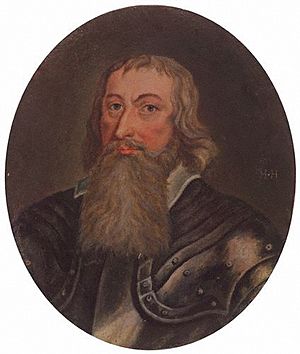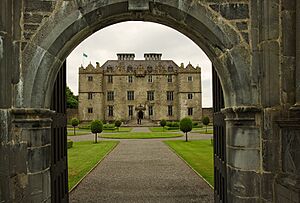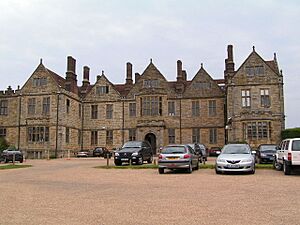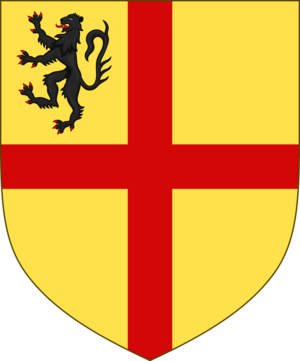Ulick Burke, 1st Marquess of Clanricarde facts for kids
Quick facts for kids
Ulick Burke
|
|
|---|---|
| Marquess of Clanricarde | |
 |
|
| Tenure | 1646–1657 |
| Predecessor | Richard, 4th Earl of Clanricarde |
| Successor | Richard, 6th Earl of Clanricarde |
| Born | 1604 London (?) |
| Died | July 1657 Kent, England |
| Buried | Westminster Abbey |
| Spouse(s) | Anne Compton |
| Issue | Margaret Burke |
| Father | Richard, 4th Earl of Clanricarde |
| Mother | Frances Walsingham |
Ulick MacRichard Burke (born 1604 in London, died 1657 in Kent) was an important nobleman from Ireland. He was known as the 1st Marquess of Clanricarde. Ulick was involved in a big conflict called the Wars of the Three Kingdoms.
He was a Catholic who supported the King (a "Royalist"). He led the Irish forces during the later part of the Cromwellian conquest of Ireland. Because of his loyalty, he was given the special title of Marquess of Clanricarde in 1646.
Contents
Early Life and Family
Ulick was the son of Richard Burke, 4th Earl of Clanricarde and his wife, Frances Walsingham. His father's family, the Burkes, were an old Anglo-Norman family who had lived in the west of Ireland for a long time.
Even though some of his family had fought against the English Crown in the past, Ulick's father was a strong supporter of Queen Elizabeth I. He even fought for the Queen during a major conflict called Tyrone's Rebellion. He was hurt in a famous battle called the Battle of Kinsale, which the Queen's side won.
After the war, Ulick's father married Frances Walsingham. She was the daughter of a very important English official and spy master, Sir Francis Walsingham.

Marriage and Children
In 1622, Ulick married Anne Compton. She was the daughter of William Compton, 1st Earl of Northampton.
Ulick and Anne had one child, a daughter named Margaret. Margaret later married a few times.
Becoming a Leader
Ulick became a member of the House of Lords (a part of the English Parliament) in 1628. When his father passed away in 1635, Ulick became the 5th Earl of Clanricarde. He also inherited Somerhill House, his family's home in England, in 1636.
Ulick did not agree with the policies of Thomas Wentworth, 1st Earl of Strafford, who was the King's representative in Ireland. Strafford tried to take away a lot of the Burke family's land in Ireland for the King. This disagreement caused bad feelings between Ulick and Strafford.
Ulick was trusted by King Charles I. He even went with the King on a trip to Scotland.
Role in the Wars
During the Irish Confederate Wars, Ulick's home, Somerhill, was taken by the English Parliament in 1645. Ulick supported the Royalist leader, Ormonde. They worked to keep Ireland loyal to King Charles I against the Parliamentarians.
Ulick, who was Catholic, tried to bring together Catholic and Protestant nobles. He did not join the Catholic group called the Confederate Ireland. Instead, he helped create a military alliance between the Confederates and the English Royalists.
He led the forces of this alliance during the Cromwellian conquest of Ireland. This was after Lord Ormonde had left the country. Soldiers from Ulick's army in Connaught helped win a small battle at Battle of Tecroghan. However, a few months later, his army was defeated at the Battle of Meelick Island.
Ulick was a good diplomat, meaning he was skilled at talking and making agreements. But he was not a great soldier. Many Catholics in Ireland did not fully trust Ulick. This made it hard for him to stop the Parliamentarians from taking over the country.
Later Life and Legacy
In 1652, Ulick made peace with Oliver Cromwell, who had won the war. He lost his lands because of a law called the Act of Settlement 1652. However, his family got their lands back after King Charles II returned to power in 1660. This happened because of another law called the Act of Settlement 1662.
When Ulick died in July 1657, he no longer held the title of Marquess. The title of Earl passed to his cousin, Richard.
Family Symbol
 | May Edward Chinn |
 | Rebecca Cole |
 | Alexa Canady |
 | Dorothy Lavinia Brown |



